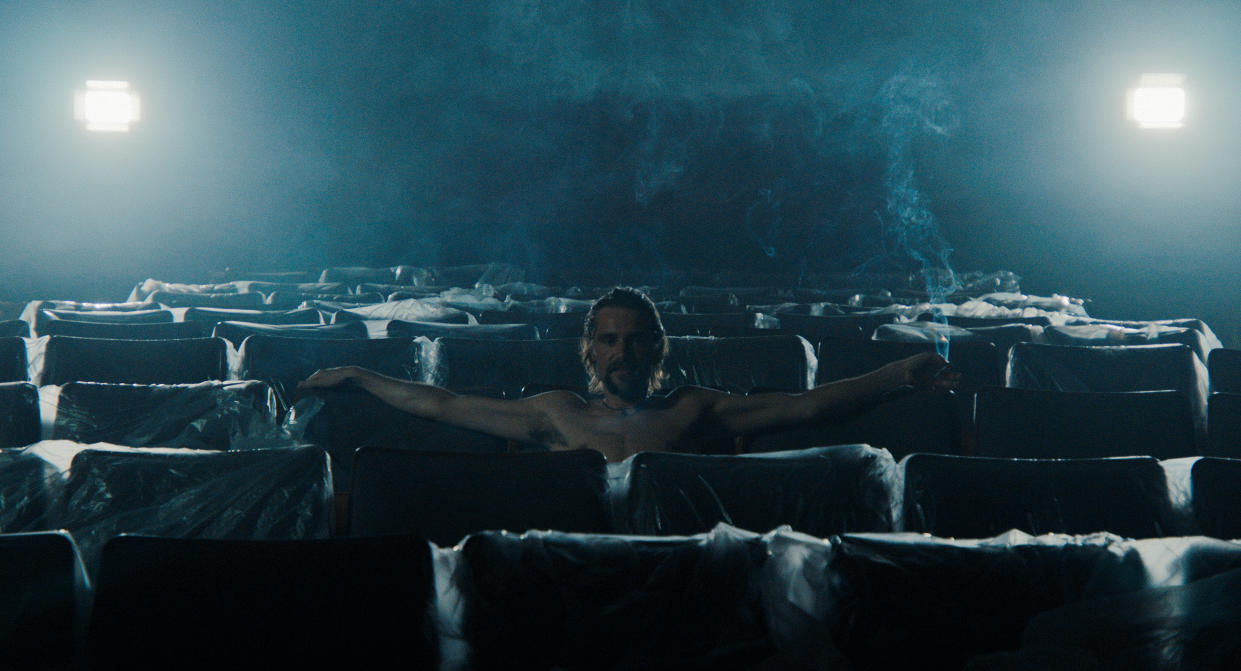‘A Desert’ Review: Decaying Americana Frames a Surreal Neo-Noir About the Evil That Forms in Empty Spaces

Drive far enough down a deserted highway, and you’ll eventually find spots where the remnants of a civilized society met the unrelenting forces of death, entropy, and decay. Crumbling buildings give way to new ecosystems as Mother Nature takes back the spaces that humanity briefly leased. These abandoned spaces are reminders that there’s nothing we can do on this planet that the universe won’t ultimately undo. Our only choice in the matter is whether we see that as depressing or poetic.
Count Alex Clark (Kai Lennox) among the latter camp. The acclaimed photographer spent much of his youth ripping through the American Southwest in a car by himself, deliberately trying to get lost so that he’d eventually find cool pictures to snap. His photos of decaying buildings earned him his first brushes with fame, and a midlife crisis has now prompted him to try and recreate his original formula for success. He left his phone and GPS at home and spends his days meandering through the desert in search of a front-row seat to nature’s reclamation process.
More from IndieWire
Each night, he checks into a different petri dish with a vacancy sign out front and calls his wife, Sam (Sarah Lind). She understands Alex’s need to retrace his own steps in order to reinvigorate his creativity, even if she isn’t always thrilled by the logistics that the mission requires. When they hang up after he regales her with stories of his day spent photographing empty theaters, she has no reason to expect the next one will be anything out of the ordinary.
But while Sam’s night proceeds as planned, Alex’s takes a turn when he calls the front desk to report a noise complaint. When his loud neighbor, Renny (Zachary Ray Sherman) — who looks like he could have played Jesse Pinkman in a porn remake of “Breaking Bad” — shows up to apologize, he offers Alex the chance to party with his prostitute sister Suzie Q (Ashley B. Smith). While Alex has the decency not to accept that offer on the spot, he eventually lets the siblings into a room under the guise of taking their photo. It isn’t long before they spend the night getting hammered on moonshine, and Alex caves to his baser instincts and sleeps with Suzie.
The old complaint that horror movie characters would be alive if they made smarter choices is usually a tired trope rooted in a lame misunderstanding of what genre movies are supposed to do. But this might be one of the rare cases where it has a bit of validity. Alex makes a series of choices so baffling that it almost feels like a twist when he inevitably goes missing — because any viewer with a hint of media literacy would expect first-time writer/director Josh Erkman to be setting up some “Barbarian”-style misdirection. But alas, sometimes life is as simple as realizing that the people who seem like they radiate chlamydia and danger actually do!
That’s where “A Desert” truly begins, as the film has more to do with the search for Alex than his actual demise. Sam immediately knows something is wrong when she stops receiving nightly phone calls from random hotels, and hires private investigator Harry Paladino (David Yow) to track him down. A former cop who lost his badge under suspicious circumstances, Mr. Paladino is certainly a man who has seen better days. The rumpled P.I. implores Sam to consider the possibility that her husband is hiding a dark vice from her, as he believes that everyone has a secret that leads to their downfall. His internal logic is likely a result of his own taste for cheap booze and parking lot handjobs that soon derails the investigation, prompting Sam to intervene and consider the possibility that the underbelly of Americana that her husband spent his life documenting is darker than she ever imagined.
Structurally, “A Desert” is a quintessential neo-noir story about a man who goes missing and a wife who gets more than she bargained for when she hires private detectives to find him. But the film breaks from genre tradition with its willingness to let many of its biggest mysteries go unsolved. Erkman fills in some of those gaps with touches of surreal horror, but is often content to let the audience bask in the unsettling desert vibes. An avid desert photographer in his own right, the filmmaker frames his many shots of crumbling roadside Americana like a deep sea nature documentary — you never know when the enemy hiding in plain sight is about to pounce. And like those photos, “A Desert” won’t be truly finished until the audience projects their own fears into the dark corners that it fails to illuminate.
The film’s wild ending will determine whether or not a viewer enjoys the film. But rather than trying to understand exactly what it means, you’re better off appreciating it like one of Alex’s photos. Just like an abandoned roadside diner becoming overrun by fungi and rodent’s nests, sometimes the emptiness is the point. When you remove the constraints of human civilization, there’s no telling what might grow in the empty space you leave behind.
Grade: B
“A Desert” premiered at the 2024 Tribeca Film Festival. It is currently seeking U.S. distribution.
Best of IndieWire
Sign up for Indiewire's Newsletter. For the latest news, follow us on Facebook, Twitter, and Instagram.

 Yahoo News
Yahoo News 
